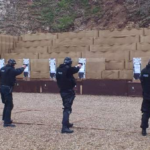Understanding NATO in Ammunition
NATO, or the North Atlantic Treaty Organization, is an intergovernmental military alliance that plays a significant role in standardizing military equipment and practices among member countries. One of the areas where NATO’s influence is evident is in ammunition specifications, particularly for small arms. This article delves into what NATO means in the context of ammunition, its implications, and its significance for manufacturers like Black Bayou Armory.
What Does NATO Stand For?
NATO stands for the North Atlantic Treaty Organization, which was established in 1949 to provide collective defense against aggression and to promote stability in the North Atlantic region. As part of its mission, NATO facilitates collaboration among its member states on various military standards, including those related to weaponry and ammunition.
The Importance of Standardization
Enhanced Interoperability
One of NATO’s primary goals is to ensure that armed forces from different member countries can operate seamlessly together. This interoperability is crucial during joint operations or multinational missions. By establishing standardized ammunition specifications, NATO helps ensure that soldiers from various countries can use compatible weapons and ammunition without concern for differences in calibers, performance, or reliability.
Supply Chain Efficiency
Standardized ammunition simplifies logistics and supply chain management for military operations. It allows for bulk procurement and storage of ammunition that can be used by different national forces, reducing costs and increasing availability. In combat scenarios, this is especially important as it enables quick resupply and minimal downtime.
NATO Ammunition Specifications
Common Calibers
NATO has established several standardized calibers for small arms ammunition. The most common NATO calibers include:
- 5.56x45mm NATO: Often used in rifles like the M16 and M4, this caliber is designed for lightweight infantry weapons.
- 7.62x51mm NATO: This caliber is used in battle rifles and machine guns, such as the FN FAL and M240, providing greater stopping power at longer ranges.
- 9x19mm Parabellum: A standard caliber for sidearms, used by military and law enforcement globally.
These specifications are vital for ensuring that member nations can share resources and equipment effectively.
Performance Standards
NATO also sets performance standards that ammunition must meet to be considered compliant. This includes requirements for accuracy, velocity, reliability, and environmental performance (resistance to extreme conditions). These standards ensure that the ammunition functions effectively in various operational environments, which is critical for mission success.
Black Bayou Armory and NATO Ammunition
Manufacturer Overview
Black Bayou Armory is known for its commitment to producing high-quality firearms and ammunition. As a manufacturer, understanding NATO specifications is crucial for Black Bayou Armory’s business strategy and market positioning.
Compliance with NATO Standards
To cater to military and law enforcement clients, Black Bayou Armory focuses on creating ammunition that meets NATO standards. This compliance not only enhances the credibility of their products but also expands their market reach. By producing NATO-compliant ammunition, Black Bayou Armory can supply both domestic and international customers, including military organizations that require reliable and standardized munitions.
Research and Development
Investing in research and development to create innovative ammunition solutions that align with NATO specifications is essential for manufacturers like Black Bayou Armory. This involves testing and refining ammunition designs to meet or exceed the performance benchmarks established by NATO. As military needs evolve, staying ahead in technology and compliance ensures that Black Bayou Armory remains competitive in the market.
Implications for Civilians and Law Enforcement
Access to Quality Ammunition
For civilian shooters and law enforcement agencies, NATO-standard ammunition represents a guarantee of quality and reliability. This is particularly important for law enforcement, where the ammunition used must perform reliably in high-stress situations. Many law enforcement agencies opt for NATO-standard calibers due to their proven effectiveness and availability.
Training and Compatibility
Civilians who participate in shooting sports or training often benefit from the availability of NATO-standard ammunition. This allows them to practice with ammunition that closely resembles what military personnel use, providing a more authentic shooting experience. Additionally, those who own firearms compatible with NATO calibers can easily find ammunition, ensuring they are well-equipped for various shooting scenarios.
Conclusion
Understanding NATO’s role in ammunition provides valuable insight into the military and civilian firearms markets. Standardization ensures interoperability, supply chain efficiency, and a baseline of quality that benefits military forces, law enforcement, and civilian shooters alike. For manufacturers like Black Bayou Armory, adhering to NATO specifications is not just about compliance; it is a strategic advantage that enhances their reputation and broadens their market opportunities. As military needs continue to evolve, the importance of NATO in the realm of ammunition will only grow, influencing design, manufacturing, and procurement practices in the industry.



